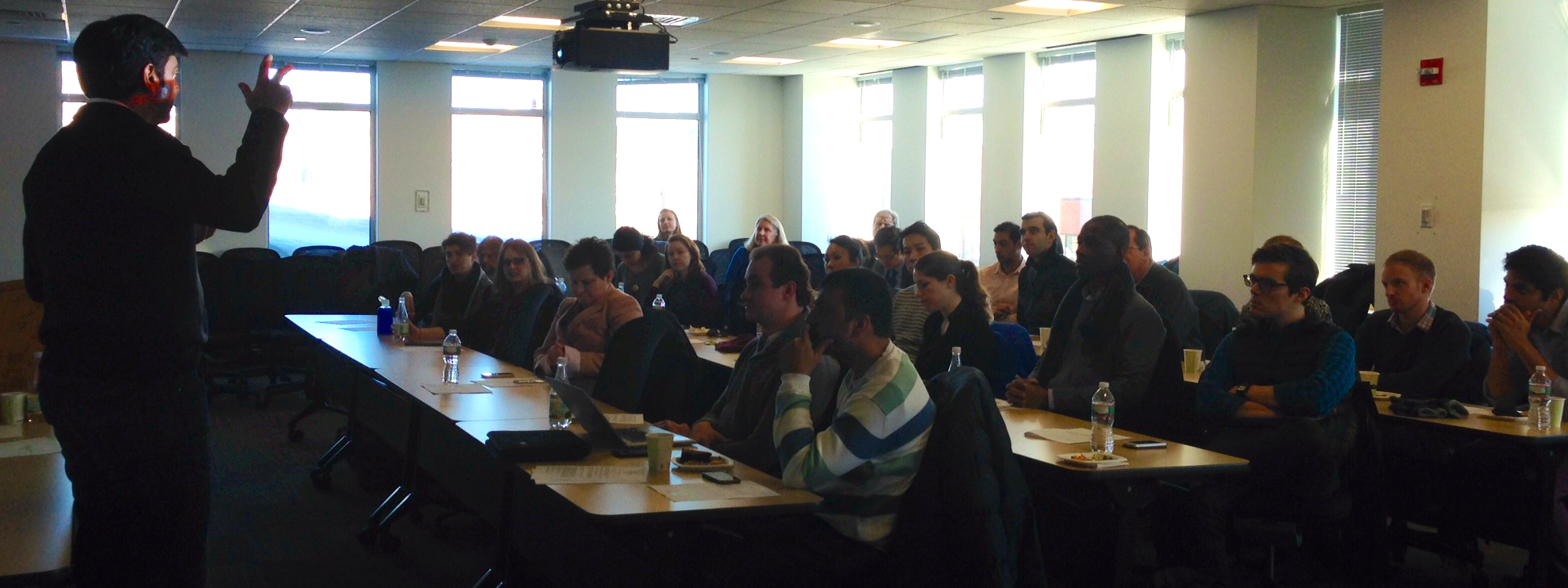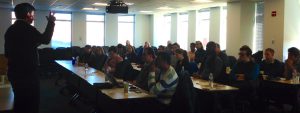
The importance of technology in government has been vividly displayed in recent public policy debates over everything from cyber security and net neutrality to the failed Obamacare website launch. As a leading public policy school, Harvard Kennedy School (HKS) seeks to prepare future public sector leaders in fields ranging from education and health care to international development and foreign policy. As these areas are rapidly transformed by technology, it’s time for all of us to ask what we can do to help the Kennedy School train students to be effective 21st century policymakers.
Read the 2015 State of Technology at HKS Report
A conversation about the state of technology at HKS has been in progress throughout the academic year – culminating in the 2015 State of Technology at HKS Report. The Report, fueled by the work done at the HKS Technology Summit and the results from the Student Technology Survey, provides a set of concrete recommendations for the 2015-2016 academic year. Specifically, HKS should:
- Offer introductory technology skills and policy classes.
- Expand cross-registration access to technology classes.
- Begin development of a new “makers” PAE cohort.
You can read the full, detailed report here.
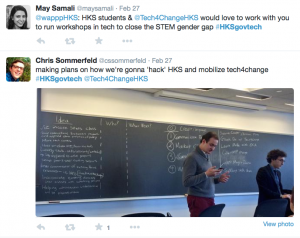
The 2015 State of Technology Report has been months in the making and it all started with a simple survey about technology policy and technical skill development at HKS. That Student Technology Survey, created by a coalition of students from varied policy interests and programs, was an important conversation starter. For the first time, student demand for technology policy knowledge and skill development was measured and defined.
What did the survey show? 94 % of students agreed or strongly agreed that technology was important to their future career plans. However, though students are interested in pursuing courses and workshops to learn about technology policy and develop technical skills, a majority were unsatisfied with HKS’s resources in this area. 68% of students wanted more technology-related classes and 82% wanted more hard skill workshops in subjects like coding and data visualization. Said one first year MPP joint degree student, “In analyzing a social venture I would like to launch during my time here, I have realized that there is a strong technology component. I will have to hire someone that can code (and likely take a coding class myself).”
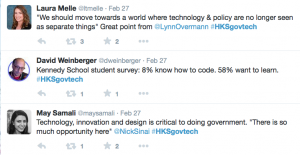
On February 27th, students, faculty, staff, and administration gathered together at the first HKS Technology Summit to react to the Student Technology Survey and brainstorm ways HKS can produce technology literate policymakers – policymakers who will inevitably make decisions in a world with drones, robotics, Internet governance issues, and digital government services. Dean Karen Jackson-Weaver, former U.S. CTO Aneesh Chopra (MPP ’97) and former U.S. Deputy CTO Nick Sinai all spoke at the event.
At the Summit, Hugo Zylberberg (MPP1), Nico Miailhe (MC/MPA), and JeeYoung Oh (MPP2) led a breakout session on long-term goals. The breakout group – comprised of faculty, fellows, students, and research center representatives – came up with a list of interesting, innovative ideas that HKS could pursue. Some highlights included:
- Develop an MPP concentration for “makers” which would allow students to not just write a policy analysis exercise (PAE), but build something new – whether it’s an application, digital service, or social enterprise.
- Offer an introductory course summarizing the basics of technology policy, technological trends, working with experts, and contracting with technical vendors.
- Create a GovTech Lab at HKS. Much like what MIT has done with the Media Lab, a future GovTech Lab could be a major convening force. Right now technology resources and research is decentralized at HKS. A lab would also be a natural home for student projects, workshops, talks, or hackathons.
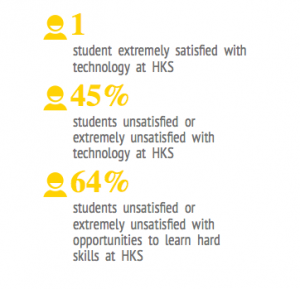
- Starting next semester, HKS can allow students to take technical courses for credit – for instance, the College’s CS-50 or MIT’s “How to Make Almost Anything.”
- Students can create (and constantly improve) a centralized list of all technology resources available in Cambridge.
- With OCA, students can reach out to alumni to understand what technology-related skills and knowledge HKS graduates need to succeed in various policy fields.
- HKS can find ways to highlight technology in existing curricula and cases.
A day before the Summit, a packed room of riveted students, professionals, and HKS staff watched a panel of Chief Technology Officers and Chief Data Officers discuss the need for technology-savvy people in government. We want to make sure that HKS is doing enough to fulfill that need and create some of the CTOs and CDOs of the future. When people like Lynn Overmann, Todd Park, and DJ Patil come back to Harvard five or ten years down the road, we want to make sure they see the value in recruiting out of HKS.
If you would like to follow the student push for more technology policy coursework and skill development at HKS, join the Tech4Change Facebook group and mailing list.
